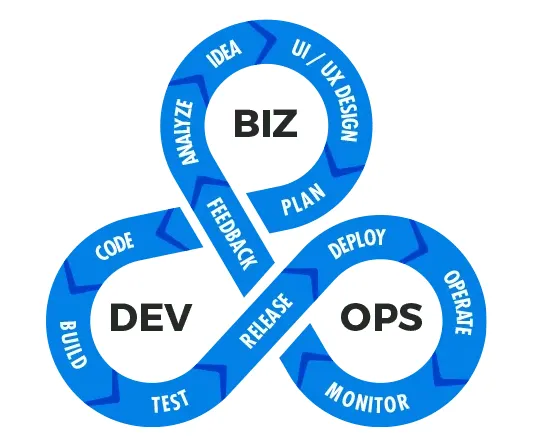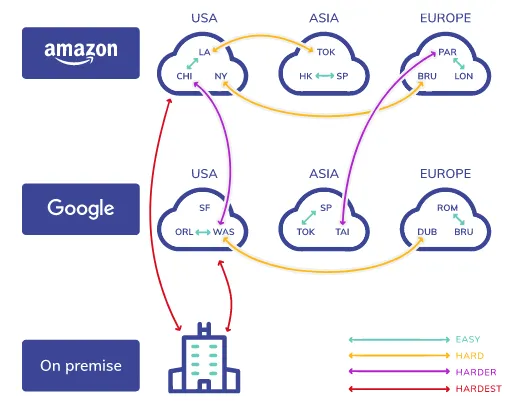Introduction
In today’s rapidly evolving business landscape, small and medium-sized enterprises (SMEs) face numerous challenges in staying competitive. They must navigate digital transformation, manage tight budgets, and continuously innovate to thrive. This is where BizDevOps (Business Development Operations) comes into play, revolutionizing the way SMEs operate by combining business development, IT operations, and development practices. This article explores why BizDevOps matters for merchants, ISV’s (independent software vendors), integrators and web builders and highlights the major benefits of Platform-as-a-Service (PaaS) compared to classic managed hosting. Furthermore, we will discuss the significance of true multi-cloud capabilities in ensuring optimal performance and scalability.
The Essence of BizDevOps
BizDevOps is a methodology that combines business, development, and operations, fostering collaboration, efficiency, and continuous improvement. For ISVs, web builders, and integrators, implementing BizDevOps practices is essential for delivering high-quality ERP implementations and e-commerce setups. By embracing this approach, these stakeholders can achieve the following benefits:
- Agile Development: BizDevOps encourages iterative and incremental development, enabling faster deployment of features and enhancements. This flexibility is crucial when SMEs require rapid iterations and adjustments to their ERP and e-commerce solutions.
- Enhanced Collaboration: By breaking down silos between business, development, and operations teams, BizDevOps promotes seamless communication and collaboration. This leads to better alignment of goals, improved decision-making, and faster issue resolution, resulting in a more streamlined implementation process.
- Continuous Integration and Deployment: BizDevOps emphasizes using automation tools and practices, enabling continuous integration and deployment. This approach ensures that new features and updates can be quickly and reliably rolled out, minimizing disruption and enhancing the end-user experience.

PaaS vs. Classic Managed Hosting
When assisting SMEs in implementing ERP systems and setting up e-commerce platforms, choosing the right hosting infrastructure is critical. Here’s why PaaS offers significant advantages over classic managed hosting:
- Scalability: PaaS providers offer elastic scalability, allowing ISVs, web builders, and integrators to accommodate the growing needs of SMEs. The ability to scale resources up or down as required ensures optimal performance and cost efficiency, especially during peak periods.
- Simplified Management: PaaS solutions abstract the underlying infrastructure and handle many operational tasks, such as system updates, security patches, and database backups. This relieves ISVs, web builders, and integrators from tedious management responsibilities, enabling them to focus on delivering value-added services to SMEs.
- Access to Advanced Technologies: PaaS solutions offer SMEs access to cutting-edge technologies and tools without requiring extensive expertise or investment. PaaS providers typically update their platforms with the latest innovations, such as machine learning, artificial intelligence, and big data analytics. This empowers SMEs to leverage these technologies to enhance their products, improve customer experiences, and make data-driven decisions.
- Faster Time to Market: PaaS platforms provide preconfigured environments and ready-to-use tools, streamlining the development and deployment process. This accelerated time to market is essential for SMEs seeking a competitive edge in the rapidly evolving digital landscape.
- Robust Security and Reliability: Security and reliability are critical concerns for SMEs. PaaS providers prioritize security measures and invest in state-of-the-art infrastructure and data protection mechanisms. They offer robust security protocols, data encryption, regular backups, and disaster recovery solutions, ensuring SMEs’ data remains safe and available. PaaS platforms also provide high availability and reliability, minimizing downtime and ensuring consistent performance for SME applications.
The Significance of True Multi-Cloud Capabilities
In today’s hybrid and multi-cloud environment, businesses often rely on multiple cloud service providers, leveraging true multi-cloud capabilities is paramount. Here’s why it matters:
- Vendor Lock-In Mitigation: True multi-cloud enables ISVs, web builders, and integrators to avoid vendor lock-in by allowing seamless integration and interoperability across various cloud platforms. This flexibility empowers businesses to choose the best services from different providers without being tied to a single ecosystem.
- High Availability and Redundancy: Leveraging multiple cloud providers ensures redundancy and high availability for critical ERP and e-commerce systems. In an outage or service disruption from one provider, the workload can be seamlessly shifted to another, minimizing downtime and preserving business continuity.
- Performance Optimization: True multi-cloud capabilities enable the distribution of workloads across different cloud providers based on specific performance requirements and regional considerations. This approach ensures optimal performance and responsiveness, particularly for SMEs with a global customer base.

Conclusion
For ISVs, web builders, and integrators assisting SMEs with ERP implementation and e-commerce setup, embracing BizDevOps practices is crucial for success in the digital era. By adopting this approach, leveraging PaaS solutions, and harnessing true multi-cloud capabilities, these stakeholders can deliver agile, scalable, and reliable solutions that meet the evolving needs of SMEs. BizDevOps, combined with the advantages of PaaS and true multi-cloud, empowers businesses to thrive in an increasingly competitive and digitally-driven landscape.
Let this be the game of DeltaBlue! When we founded our company, it was based on experiences and profound principles;
- There is no vendor lock-in; We are an open platform, maintaining an openly shared root model. We don’t ask you to sign multi-year lock-in contracts, but we love mutual commitment.
- You pay as you grow; To maintain a solid long-term relationship, we want you to succeed and grow as efficiently as possible. Our billing engine makes it transparent where and how much resources you consumed for what project. Together with our partners, we always strive for full transparency.
- Ultimate scalability: Both technically and business-wise, we aim for advanced automation.
With our cloud platform, we have built two products. DeltaBlue.Cloud and Hyperlane. Both include the best practice methodology based on the 12-factor standard, and we provide the ability to operate, develop and deploy your applications in a true hybrid cloud environment. And we are serious about it; Many hyper scalers make it possible to scale within their closed environment, and some managed hosters offer you to move across different data centers. At DeltaBlue, however, you do not have to worry about how your application will move from on-premise over the private cloud to the public cloud and worry about the different performance characteristics.
Ready to discover how we achieve a better TCO? Get in touch now and become part of the no-churn club (=our happy customers)

